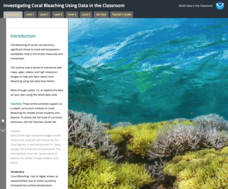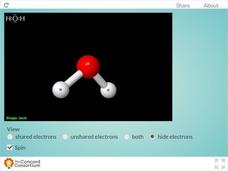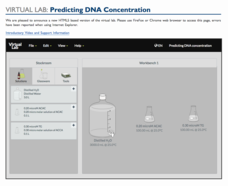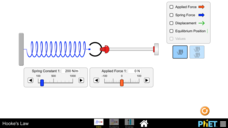NOAA
Investigating Coral Bleaching Using Data in the Classroom
Approximately 93 percent of the individual reefs in the Great Barrier Reef suffer from coral bleaching. Scholars learn how scientists monitor coral bleaching around the world as part of a larger series. They use actual data to answer...
Project WET Foundation
Investigate Fresh Water
It's all about freshwater in this water interactive! Users navigate through freshwater habitats such as lakes, rivers, and wetlands, taking note of the animals that live there. They also look at a desert habitat for comparison....
Chemistry Collective
Virtual Lab: Measuring the Heat Capacity of an Engine Coolant
Combine automotive science with chemistry! Young scholars investigate an alternative to the traditional engine coolant. They mix the chemicals virtually and collect data to determine the specific heat capacity.
Curated OER
All About Circuits ~ Atomic Structure
In this interactive Internet assignment, physical science investigators answer 11 questions about the atom, the subatomic particles, and atomic structure. They can click on "Reveal Answer" to discover if they are correct. They also...
Curated OER
Investigating Interesting Insect Information
In this investigating interesting insect information worksheet, students answer 28 short answer questions about insects. This page includes several links to helpful web resources.
Scholastic
Study Jams! Investigations to Collect Data
Print out the lyrics or show the karaoke video to get your scientists singing about the scientific process! Participants will warble about observations and measurements, data and physical properties. Consider sharing this resource after...
NOAA
Investigating Sea Level Using Real Data
The news reports on rising sea level, but how do scientists measure this rise? Scholars use NOAA data including maps, apps, and images to work through five levels of activities related to sea level. Each level in the series adds a new...
Concord Consortium
Unshared Electrons and the "Bent" Shape
Why is water always so bent out of shape? Scholars investigate the molecular geometry of the water molecule using a 3-D resource. The interactive features options such as rotation and the ability to view electron pairs.
Chemistry Collective
Virtual Lab: Predicting DNA Concentration
Play a little game of concentration! A virtual lab investigation allows learners to predict the products and reactants of a DNA reaction. They make their calculations and then test their predictions in the lab workbench.
American Museum of Natural History
Trip Up Your Brain
Sometimes different parts of the brain disagree. See what this disagreement looks like using a remote learning resource to experience how brains often take shortcuts. Pupils complete the activity, observe their results, and then read...
CK-12 Foundation
Development of Hypotheses: Pressure versus Temperature
Is it me, or is it getting hot in here? Middle school science sleuths investigate the relationship between temperature and pressure, then use their observations to form a hypothesis. Questions embedded in the interactive help guide...
PHET
Hooke's Law
Everything from pens to cars use springs — some are just on a larger scale! An interactive simulation encourages pupils to stretch and compress springs while observing the changes to force, displacement, and potential energy. Then they...
PHET
Faraday's Law
Could a flux capacitor really work? An engaging simulation encourages scholars to investigate Faraday's law. They experiment with various speeds, magnitude, voltage, and different-sized coils. Hopefully experimenters will be able to...
Chemistry Collective
Virtual Lab: Identifying the Unknown Metal (Metals Density Problem)
A metal's density could be considered its fingerprint! A virtual lab activity has learners calculate the density of a sample of metal to make its identification. The simulation allows individuals to perform the measurements as if they...
Concord Consortium
Plastic Forces
Plastic is fantastic! But, why does it behave the way it does? Science sleuths investigate the behavior of plastic in response to applied forces using an interactive. The resource allows users to bend a sample of plastic using three...
Concord Consortium
Specific Heat and Latent Heat in Condensation
There's more to melting than meets the eye! Junior physical chemists investigate the differences between specific and latent heats as a substance undergoes a phase change. Users remove heat from the system and observe changes in kinetic...
Concord Consortium
Gas Pressure in a Syringe
Plunge into a gas pressure activity! Junior physical scientists manipulate a syringe to study the particle model of gases. The interactive invites investigations of particle movements in capped versus uncapped syringes.
Concord Consortium
Dissolving
What happens to substances when they dissolve in water? Young scientists investigate the dissolving process with a colorful interactive. The resource illustrates changes in potential energy as solute particles interact with water...
Chemistry Collective
Virtual Lab: Determining Stoichiometric Coefficients
Investigate the reaction between four unknown substances using a virtual activity. Eager chemists examine the reaction between the four solutions to build a stoichiometric equation. The virtual workbench provides the tools necessary to...
Chemistry Collective
Virtual Lab: Determining the Heat of Reaction in Aqueous Solution
It's gettin' hot in here! An investigative activity has learners measure the heat of reaction in a virtual setting. After exploring the reaction, they attempt to create a solution at an exact temperature.
American Museum of Natural History
Journey to Deep Sea Vents
Take a deep dive into oceanography. The online interactive allows for learners to board a submersible to dive to the bottom of the ocean to investigate sea vents. On the way down, individuals see different marine life at different...
McGraw Hill
Gravitational Lensing Interactive
Investigate light in space as it encounters a large mass of matter. Learners discover the idea of gravitational lensing through an interactive activity. They adjust the size and location of the mass to see the effect on the path of...
CK-12 Foundation
At the Crossroads
Young scientists investigate methods of comparing standard and metric units with a technology-enhanced lesson that builds a connection between conversion ratios and the corresponding units. The simulation allows learners to...
CK-12 Foundation
Energy Conservation Simulation
Does the amount of a roller coaster's energy change as it goes along the track? Scholars investigate when a roller coaster has potential and kinetic energy. They observe the changes as it goes up the initial hill follows it throughout...























